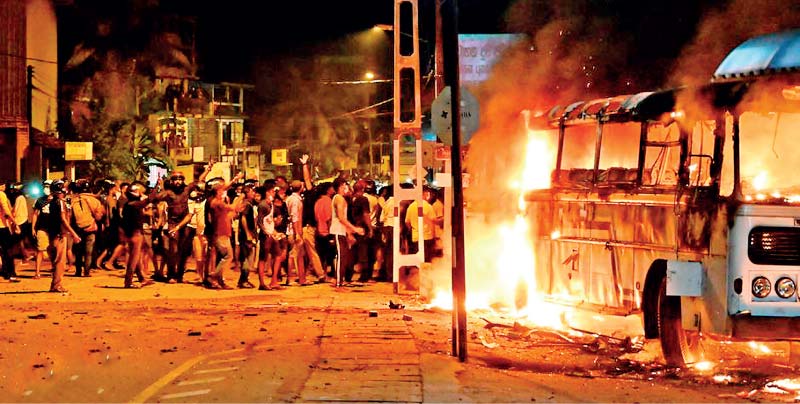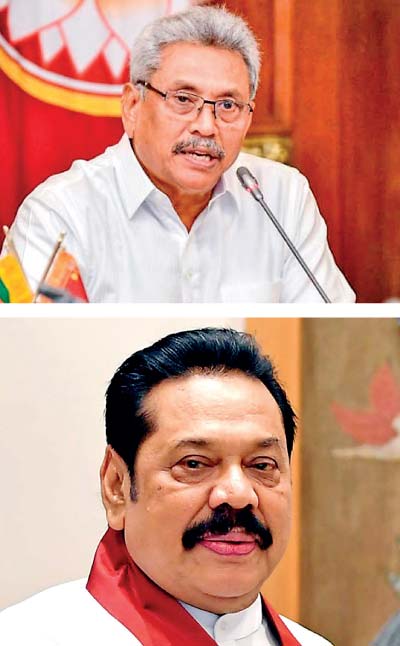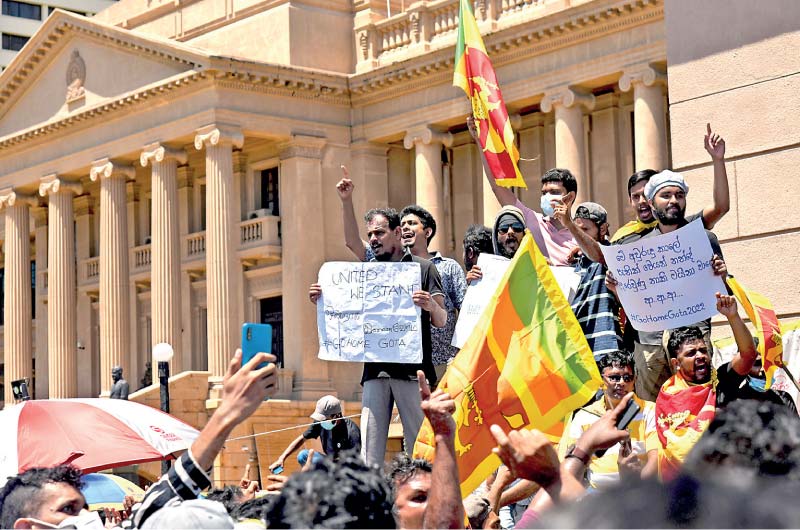Wednesday Feb 11, 2026
Wednesday Feb 11, 2026
Wednesday, 4 May 2022 02:41 - - {{hitsCtrl.values.hits}}

|
by Tisaranee Gunasekara
“Ain’t it nice to fly?
You’re waving as soft clouds go by
But peace won’t be still of its own free will”
– Gil Scott-Heron (Free Will)
 The Rajapaksa’s, an immovable object; the popular resistance, an unstoppable force; their meeting has created an impasse. Can it be unblocked constitutionally and peacefully before it is sundered anti-constitutionally and violently?
The Rajapaksa’s, an immovable object; the popular resistance, an unstoppable force; their meeting has created an impasse. Can it be unblocked constitutionally and peacefully before it is sundered anti-constitutionally and violently?
More than a month since the Mirihana protest changed the Lankan political landscape in unimaginable ways, the Rajapaksa’s continue to retain the levers of power. Gotabaya Rajapaksa is still the President and Mahinda Rajapaksa is till the PM (though the latter is widely expected to resign this week). The President’s personal lawyer, a political novice with no base, and thus completely dependent on the Rajapaksa’s for survival, is in charge of the key portfolio of Finance. Basil Rajapaksa continues to act as the trouble-shooter – and possibly policymaker – behind the scenes.
The soothsayer-economics which gave us slash-and-burn tax cuts, money printing binge, exchange rate mismanagement and abracadabra fertiliser fiasco continues to inform policy. Two cases in point: VAT has been hiked – adding to inflationary pressures - while the 2019 tax bonanza to high earners remains untouched; had it not been the opposition from the Opposition, SriLankan Airlines, headed by a Rajapaksa business acolyte, would have gone ahead with plans to lease 21 planes, while people suffer and die for the lack of medicine.
At the ground level, the popular resistance continues, intent on evicting not this or that Rajapaksa but the entire family from politics. The popularity of President Gotabaya and PM Mahinda has plummeted, according to a survey by the Institute of Health Policy (IHP). Another national survey by the Centre for Policy Analysis (CPA) reveals that more than 87% percent of respondents want the whole Rajapaksa family to leave Lankan politics.
Both surveys identify economics as the main reason for the anti-Rajapaksa groundswell. In the CPA survey, 90% of respondents say that their income or the income of an immediate family member has been affected by the current crisis. Only 9% remain immune to the ongoing economic conflagration. 88% say they or an immediate family member had to stay in queues for essentials in the past month. Only 4.4% blame COVID and 2% blame international economics for their economic plight. A solid 62% blame the economic mismanagement by the Gotabaya Government for the country’s and their suffering.
The Rajapaksa Inc. is incapable of grasping the gravity of the crisis, and believes that both economic woes and popular resistance will melt away with time. Buying time and staying put seems to be their strategy.
The popular resistance wants the Rajapaksa’s to go. It is this near unanimous opinion that is empowering and sustaining acts of resistance across the country, from Gota-go-gama at Galle Face to the mother-daughter duo who protested alone on the Kalutara bridge.
If a constitutional way out of the current impasse cannot be found, fast, force might become unavoidable. Through the resulting cracks, the military may enter the halls of power, either as an equal partner of the embattled Rajapaksa’s or as their (initially popular) replacement. After all, how do we know what promises Madam Soothsayer has made to her non-Rajapaksa devotees, what shining futures she has held up before their dazzled eyes?
|
Bare Times
The Rajapaksa’s, taking a leaf out of the LTTE’s totalitarian playbook, turned the Fourth Eelam War into a total war against all Tamil people. In 2008, the website Tamilweek carried an image symbolic of the plight of tens of thousands of civilian Tamils rendered homeless and defenceless by that total war. The picture was of a family of refugees on a fruitless search for a safe haven; an elderly man, a teenage girl, a glimpse of a woman, a young child, all with the expressionless faces of the hopeless, sitting atop their pitiful belongings, holding their brown dog. The Rajapaksa’s named that brutal war a Humanitarian Offensive with zero-civilian casualties. All civilian deaths were denied, civilian injuries dismissed as inconsequential, mourning outlawed and compassion damned as treachery.
The Rajapaksa attitude to the current Lankan crisis is no different. Just as they ignored the enormous suffering of the Tamil people then, they are glossing over the growing plight of all Lankans now, including their own Sinhala-Buddhist supporters. Just as once their sole object was to win the Eelam War fast, at whatever cost to Lankan Tamils, now their sole concern is to stay in power for as long as possible, at whatever cost to all Lankans, including their base.
In mid-April this year, doctors in Government hospitals sent out a SOS about shortages of life-saving medicines. Within hours, the Health Ministry responded, denying any shortage. This week, a Facebook post recorded the death of a 39-year-old father of three who died of a heart attack because the two hospitals he was taken to lacked the lifesaving heart medications (මේ මියයන්නේ අපේම මිනිසුන්ය - රටේ තත්වය ගැන අනුවේදනීය කතාවක් ... - LNW). Last week, medicine prices were increased again by as much as 40%.
In Rajapaksa eyes, we are all Tamils now (or Muslims).
This week, Wimal Weerawansa and Udaya Gammanpila sat down to a pow-wow with Basil Rajapaksa, the man they decried as an Ugly American and swore never to work with just the previous week. Agreement was soon reached on forming an all-parties Government. To ease his way back to the Rajapaksa-fold, Wimal Weerawansa, in a May Day diatribe, accused Galle Face protestors of sporting anti-Buddhist placards and damned the protests as an imperialist plot. A group of Buddhist monks (many of them ardent believers of the Gotabaya-Mahinda Panacea until recently) jumped into the act, chanting the virtues of an interim Government under President Gotabaya.
Interim Government or all-parties Government, any arrangement that permits the Rajapaksa’s hold onto the levers of power will worsen the crisis and drag Sri Lanka to a new low. How can it be otherwise, when the President – the Rajapaksa most responsible for our current plight – continues to retain all the excessive powers of the Executive Presidency, including the power to appoint and sack Ministers? In any case, given the nature of the potential participants of the latest Punch and Judy show, whatever administration that results is likely to get bogged down in the usual squabbles about who gets what portfolio.
During the long Eelam War, economic warfare was high on the LTTE’s agenda. Attacks on the Central Bank, the oil refinery, and the airport were key landmarks of this strategy. The economy reeled, sometimes buckled, yet recovered. The Rajapaksa’s have done to the Lankan economy in two years what Vellupillai Pirapaharan failed to do in 25.
The people, going by the CPA and IHP surveys, know that the ousting of the Rajapaksa Inc. is a necessary precondition to resolve the current crisis. But their distrust extends to all those who make a (very good) living out of politics, enjoying lifestyles, perks and privileges denied to most Lankans. According to the IHP survey, the net favourability ratings of not just the two Rajapaksa brothers but also of Sajith Premadasa and Anura Kumara Dissanayake have declined. According to the CPA survey, 74% want to scrap the presidential system, the essential vehicle of the myth of the saviour-leader. 82% want the country to be governed by a Committee of Experts until the current crisis is resolved. 96.2% say that all politicians should be audited and all unaccountable wealth confiscated.
The new zeitgeist, characterised by a lack of faith in saviour leaders, seems incomprehensible not just to the Rajapaksa’s but also to Opposition parties – going by the JVP’s continued promotion of Anura Kumara Dissanayake and Sajith Premadasa’s continued promotion of himself. A little less bombast and a little more humility might fit the times.
In 2019, when the tax base was slashed, experts expressed concerns about possible fallout, but always anonymously or in private. Criticising Rajapaksa’s then was a thankless task. A majority of Lankans, reposing a near-religious faith in the Rajapaksa’s, saw everything they did as good and necessary. A nation of subjects was born revelling in its own slavery.
Today that transition is being reversed. A nation of subjects is turning itself into a nation of citizens. People, once happy to grovel before politicians, are developing a vertebra. It is evident in the uncountable and myriad acts of protests mushrooming across the country with no central organisation, just one or more persons armed with nothing but a hand drawn poster. It is evident in motorists objecting to arbitrary road closures, and people opening public works constructed with their own tax money.
Whether this new found irreverence towards politicians can become deeply rooted or will be a mere passing wind remains to be seen. A long impasse might debase this healthy distrust of all politicians into a dangerous distrust of democratic politics. As the deadlock continues and the crisis worsens, the idea of a saviour might march in through the backdoor, this time clad in khaki.
|
A new synthesis
Last month, three young people (two of them women) walked for four days from Kandy to Gota-go-gama in Galle Face, in an act of solidarity. As one of the female marchers told the media: “We managed not because of the strength of our bodies but because of the strength of our minds. We don’t have a personal problem with the Government. We are not asking anything from the Government either... We are saying ‘leave us a country where we can live in freedom and manage with the income we earn through our work’.” (https://www.youtube.com/watch?app=desktop&v=Aq9GUdG3AHg).
In an interview with the American publication, The Nation, historian Gary Gerstle identified one of the key questions of the current time is whether “new political movements emerge with the strength to compel a serious redistribution of wealth away from elites and toward the masses without reproducing the tyranny that became so intrinsic to communism”. A synthesis between political freedom, social cosmopolitanism, and economic justice seems to be one of the animating ideas of the Lankan protest movement, as the above statement by the young female marcher indicates.
The Washington Consensus is over. The neo-liberal moment in history has ended. What was until recently decried as radical socialism, such as taxing the rich, generous social welfare, even a universal basic income, is now permissible. The Chinese-Russian challenge has made it necessary for the West to demarcate its own version of capitalism, aiming for a model that is a little kinder and less unequal, what social historian Michael Kazin calls ‘Moral Capitalism’, a system which stands “for the interests and needs of ordinary people...and against the big interests”.
As the CPA survey indicates, Lankan people understand that there are no quick solutions to the current crisis. 57.7% think a resolution will take a long time while another 14.3% think it will take some time. But for this understanding to be manifested in patience and endurance, any policy package must be fair. There cannot be austerity for the poor and middle classes while the rich and the powerful continue to enjoy the good life. Any such austerity program will worsen the economic crisis by heaping violent social unrest atop it.
The Opposition’s unwillingness to address controversial subjects such as taxes and military expenditure has prevented the crafting of practical economic solutions to the current crisis. This lacuna, by reducing the Opposition’s attractiveness, is further strengthening the current impasse. Though there’s general agreement that the Rajapaksa’s should go, there is no consensus about who should succeed him. The crisis is also a crisis of alternatives.
Perhaps the Lankan private sector can take a leaf from international initiatives such as Patriotic Millionaires, an American group consisting of one percenters who demand that they and their financial peers be taxed more, as a way of reducing high inequality. As a vocal member of Patriotic Millionaires, Abigail Disney of the Disney dynasty said: “...if we don’t ruffle some feathers now, we are going to have a class war, a real one” (https://www.theguardian.com/us-news/2022/apr/08/patriotic-millionaires-one-percenters-pay-higher-taxes). This, after all, was the winning choice Western capitalism made in the aftermath of the Second World War: exchange the pre-war – and especially fin de siècle - super profits for moderate gains, systemic stability, and long-term survival.
The current Lankan poverty rate might be closer to 50% than 40, and growing. If the plight of the poor, the new poor, and the soon-to-be-new poor is not addressed, they can become unconscious dupes of an anti-democratic leader who promises salvation fast. The longer the current impasse lasts, the worse the economic crisis becomes, the more likely the danger of such a uniformed saviour marching in.
|
